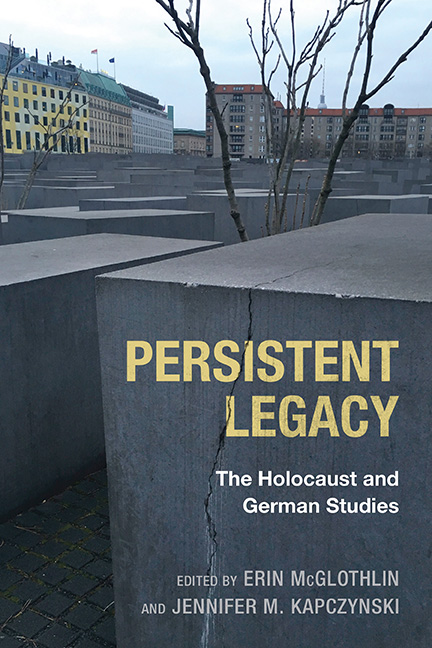Book contents
- Frontmatter
- Contents
- Acknowledgments
- Introduction
- Part I Abiding Challenges
- Part II The Holocaust in German Studies in the North American and the German Contexts
- Part III Disentangling “German,” “Jewish,” and “Holocaust” Memory
- Part IV Descendant Narratives of Survival and Perpetration
- Part V Remediated Icons of Memory
- Part VI Holocaust Memory in Post-Holocaust Traumas
- Notes on the Contributors
- Index
2 - The Voice of the Perpetrator, the Voices of the Survivors
Published online by Cambridge University Press: 17 June 2021
- Frontmatter
- Contents
- Acknowledgments
- Introduction
- Part I Abiding Challenges
- Part II The Holocaust in German Studies in the North American and the German Contexts
- Part III Disentangling “German,” “Jewish,” and “Holocaust” Memory
- Part IV Descendant Narratives of Survival and Perpetration
- Part V Remediated Icons of Memory
- Part VI Holocaust Memory in Post-Holocaust Traumas
- Notes on the Contributors
- Index
Summary
I.
ONE OF THE MOST persistent challenges for scholars who research and teach about the Holocaust is the question of how to balance the voices, perspectives, and narratives of the victims and survivors with those of the perpetrators. Historians in particular, whose accounts of the Holocaust have until relatively recently relied chiefly on the prolific documents, narratives, and interpretive frames of the Nazi perpetrators, have recognized this as a recurrent dilemma attendant to their inquiry. As Mark Roseman writes, “history (outside Israel) has been particularly slow as a discipline to take the Nazi victims seriously as sources of information, and has tended to focus much more heavily on the records left behind by the perpetrators.” Jeffrey C. Blutinger attributes the bias toward perpetrators’ accounts to the nature of contemporary historiography, which tends, “particularly in classroom teaching, to focus on historical actors” and which “leads us into a false dichotomy between oppression and resistance, implicitly disparaging those who for whatever reason did not resist but who suffered and died nonetheless.” In recent years, historians of the Holocaust have made earnest and fruitful efforts to correct their partiality toward the voices of the perpetrators, as demonstrated by deliberate attempts on the part of scholars such as Christopher Browning and Saul Friedländer to write history based on Jewish testimony and collective experience. However, as Browning acknowledges, the recent historiographical turn toward the victim and survivor still presents persistent challenges:
The use of survivor testimony, therefore, is not a Holocaust historian's “silver bullet” that will answer all his questions and solve all his problems. Claiming that survivor testimony must be accorded a privileged position not subject to the same critical analysis and rules of evidence as other sources or, even worse, lodging the indiscriminate accusation that a historian has not used survivor testimony as a weapon to discredit both his or her work and character, will not serve the cause of integrating survivor testimony into the writing of Holocaust history. They will merely discredit and undermine the reputation and integrity of Holocaust scholarship itself.
- Type
- Chapter
- Information
- Persistent LegacyThe Holocaust and German Studies, pp. 33 - 54Publisher: Boydell & BrewerPrint publication year: 2016
- 4
- Cited by

